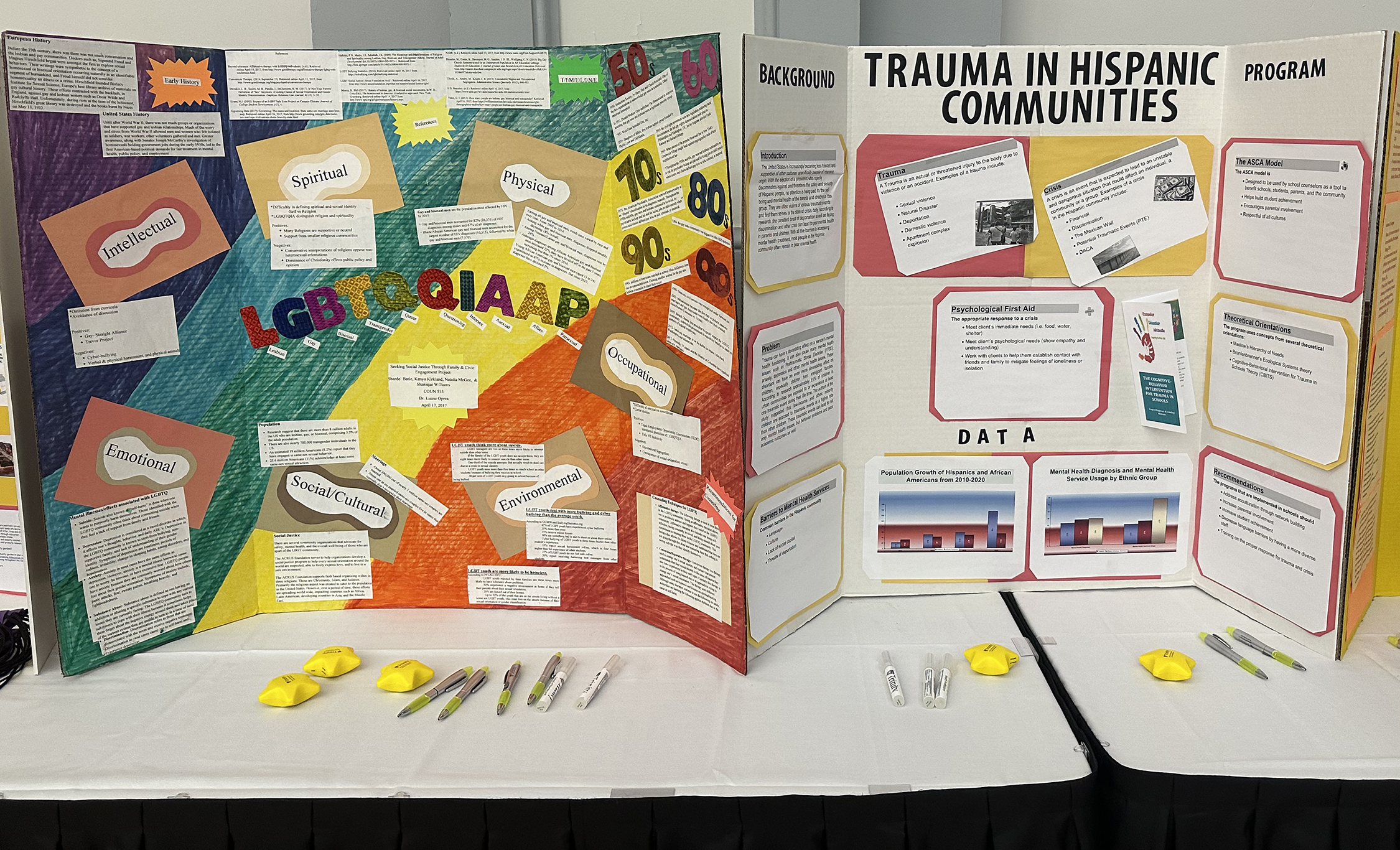
By Sondreen Johnson and Ingry Reyes
Trinity Times Correspondents
What’s often lost in discussions of racism, sexism and inequality is the psychological trauma these social ills have on swaths of the population.
Promoting healing of this kind of mental distress was accentuated during Trinity Washington University’s Social Justice Forum 2024, which provided a platform for students and faculty to engage with pressing social issues, fostering an environment of advocacy and recovery.
Alarming statistics from the Centers for Disease Control and Prevention (CDC) indicate that Black women face a two to three times higher risk of dying from pregnancy-related complications compared to white women, with many of these deaths preventable.
Knowing that systemic racism in the healthcare system can be at the root of these kinds of statistics inflicts immeasurable mental distress on Black women when they encounter a health crisis, said Ayanna Blue, a Trinity graduate student in the Clinical Mental Health Counseling program, during the April 25 forum sponsored by the Trinity Counseling Programs and The Research Initiative on Adverse Childhood Experiences and Trauma.
Blue shared her own story of social injustice as a Black woman in the healthcare system with the audience that illustrated the difficult journey she and her husband endured in starting a family.
That long-problematic road included multiple misdiagnosis on numerous occasions with several medical professionals before finally having her son.
This traumatic medical expedition prompted Blue to begin her own research into Black maternal health trials and with raw emotion she told the audience she is convinced her race played a major role in the lack of maternal care she rightfully deserved.
“Reproductive freedom is my birthright,” she said, “and over the last decade I have personally experienced what it feels like to have it stripped away.”
During her heartfelt presentation Blue accentuated the CDC statistics that show the maternal risks Black women face applies across all income and education levels.
According to a study by the National Bureau of Economic Research, even the wealthiest Black women in California are at a higher risk of maternal mortality than the least wealthy white women.
“My greatest advocate for medical treatment was myself,” Blue said. “I’ve learned that there is truth in the statement that the body keeps the score. No truer words can be spoken when I reflect on my Black maternal crisis.”
After telling the audience her story is living proof that Black maternity healthcare inequality exists, Blue received a standing ovation.
“Social justice is equality for all,” Blue said while drawing attention to the harrowing experiences faced by Black women in medical settings.

Black women giving birth are also more likely to experience life-threatening conditions such as preeclampsia, postpartum hemorrhage, and blood clots.
Additionally, they have a higher incidence of other pregnancy-related complications, such as preterm birth and low birth weight.
In the midst of a national reckoning with the systemic racism deep-rooted in American society and healthcare, advocates are advancing solutions from various fronts. These include policy reform, changes within health systems and medical education, and strengthening community-based groups advocating for improved care and resources for Black mothers.
Blue’s vulnerability when discussing the maternal risks for Black women resonated deeply with Claudia Portillo-Diaz, a graduate student in Trinity’s School Counseling program, highlighting the heartbreaking reality of lived trauma.
The theme of the forum, “Truth, Equality, and Healing: Developing a Trauma Responsive Platform to Build Community Resilience,” set the stage for meaningful dialogue and introspection.
The importance of utilizing storytelling in counseling training must be underscored, said Cynthia B. Greer, an associate professor of counseling at Trinity.
“Every culture has its own storyteller, and every culture has its own story,” Greer told the audience at the forum, emphasizing the power of narrative in understanding diverse experiences.

Elaborating on the significance of Blue’s narrative, Greer noted how it exposed systemic injustices in healthcare.
“Ayanna’s story shows that there are so many social justice issues in terms of Black bodies not being protected in the medical field,” she said, adding the destructive nature of the prevalent misconceptions about pain tolerance among people of color, and the historical exploitation of Black women’s bodies.
Trinity’s counseling program integrates students’ personal experiences into research to foster a deeper understanding of social justice issues.
Greer emphasized the importance of creating a safe space for students to share their stories authentically.
“Honesty and authenticity are key,” she said, encouraging students to prioritize healing before sharing their narratives.
The forum not only provided a platform for advocacy but also served as a catalyst for personal and collective healing.
Portillo reflected on the impact of hearing fellow students’ stories, recognizing the interconnectedness of trauma and social injustice.
“After listening to everyone’s presentation, you can see that our Trinity community is definitely involved in the social justice crisis,” she said.
As the event concluded, the resounding message echoed by participants was one of hope and empowerment.
It was Greer’s hope for students to emerge from the forum with a deeper understanding of societal injustices and a commitment to advocacy.
“Our program is based on a theoretical base of social justice,” she said, underscoring Trinity’s dedication to nurturing culturally competent counselors.The intention of this forum was for those attending to experience the transformative power of dialogue and storytelling in advancing social change by amplifying marginalized voices and fostering empathy, Greer said.
Ayanna’s moving personal story and her vulnerability and courage in sharing it leads to her passionate ability to dig deep, use research, gain keen insight and understanding through statistics and other’s stories providing her and us with the much bigger picture of systemic racism in the medical community. Keep shining a bright light, Ayanna!